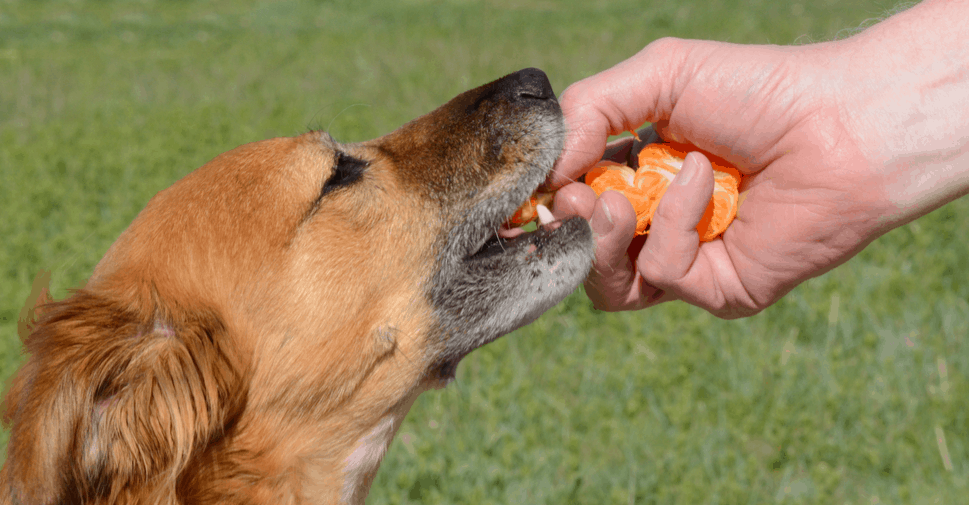When you hear of oranges you get an image of fresh and juicy oranges in your mind. Oranges are fresh in looks and a rich source of vitamin C for humans.
But can dogs eat oranges?
Well yes, dogs can eat oranges. But there is more to it!
The vitamin C present in oranges is useful for both humans and animals. Dogs surely can have oranges under human supervision, so that they don’t overeat the fruit.
There are natural sugars in oranges that have many health benefits. You might like eating oranges and when you do so you might find your dog drooling in the corner.
Oranges are practically safe for dogs. The relation between oranges and dogs is quite healthy and has both advantages and disadvantages. Read further and find more about how beneficial are oranges for dogs.
Table of Contents
Can Dogs Have Oranges?

People have many questions that can dogs have oranges? tangerines, clementine etc. all the above are all similar yet different from each other. The only thing that binds them together is that they are all filled with citric acid.
Due to a variety of these fruits, people tend to ask can dogs have oranges. The citrus filled fruits make dog owners cautious about oranges for dogs. The citric acid present in oranges, tangerines, and clementines is not harmful to dogs.
The natural sugars present in these citrus fruits may cause digestive issues in dogs if consumed in large quantities. Dogs can have oranges if only fed in moderate amounts.
There are not just doubts about oranges but people have many other doubts like Can dogs eat Apples? Can dogs eat Watermelons?
Health Benefits of Oranges for Dogs

Oranges have many health benefits for dogs. They contain high amounts of potassium, thiamine, folate, and vitamin C. Oranges are particularly low in sodium quantity.
These minerals are helpful for both humans and dogs. However, the number of oranges consumed by dogs should be limited.
Oranges help in building a dog’s immune system. The vitamin and nutrients present in oranges help boost their immune system. This also helps them in getting rid of any toxic foods they may have eaten by mistake.
Vitamin C for Dogs

Oranges are the powerhouse of vitamin C. Unlike humans, dogs can produce vitamin C and do not need oranges for the same. But there can be situations where a dog needs an external supply of vitamin C.
Dogs that have a vitamin C deficiency are also benefitted by eating oranges. Considering this some dogs may need to be put on supplementation of vitamin C. Oranges turn out to be the best organic supplement of vitamin C for such dogs.
Similarly, when dogs experience extreme stress or undergo excessive exercise sessions it hinders the production of vitamin C in their liver. In such cases, feeding these dogs oranges will do the job for them.
Older dogs or aging dogs become incapable of producing vitamin C naturally. For older dogs slices of oranges given in appropriate proportions helps strengthen the immune system.
If your dog is allergic to oranges or doesn’t like oranges you can try other fruits rich in vitamin C. Pears, strawberries, cantaloupes, and tomatoes are some other fruits rich in vitamin C.
If your dog is allergic to all fruits and has vitamin C deficiency you can use a vitamin C supplement.
Oranges For a Healthy Dog Heart
Oranges are loaded with potassium. Potassium is an important mineral for the body. It is an electrolyte mineral that helps the heart in functioning effectively.
Low levels of potassium often create chances of developing Arrhythmia. Arrhythmia is a heart condition in which the heart beats start beating in an abnormal rhythm.
This mostly happens in older dogs. Oranges for dogs, especially older dogs can work wonders in treating dogs diagnosed with Arrhythmia. However, you must recommend a veterinarian before feeding the dog oranges.
Suggested: Can Dogs Eat Watermelons?
Oranges Help to Lower Cholesterol in Dogs
Oranges have great benefits for dogs having high cholesterol levels. When there is too much lipid in the blood, cholesterol levels will elevate. To reduce these blood lipids a low-fat diet with a lot of fiber is what the body needs.
For dogs with high cholesterol, oranges are a source of a low-fat diet with lots of soluble fibers. The packaged dog food contains fats that may cause high cholesterol or Hyperlipidemia in dogs.
Feeding the dog oranges under the guidance of a veterinarian helps dogs in lowering the cholesterol levels.
Can Dogs Eat Tangerines?

Tangerine is the hybrid of the mandarin orange. Oranges and tangerines are almost similar. They are pretty much similar to oranges but on a smaller scale. The nutrients filled in both the fruits are also the same.
Nearly all the above-mentioned health benefits are also the same in the case of tangerines and oranges. When people ask can dogs eat oranges? These people often ask that can dogs eat tangerines.
Yes, dogs can eat tangerines as well. But if experts and veterinarians are to be believed this citrus fruit is more perishable for small breeds. A smaller breed of dogs finds tangerines easier to consume than oranges.
Oranges are larger than tangerines and small dogs are always recommended to consume smaller fruits. This avoids any chunk of big fruits to cause digestive issues in smaller dogs.
Can Dogs Eat Orange Peels?

With all the above questions having an affirmative answer this question has a negative answer. No, dogs cannot eat the orange peel or orange rind.
Orange peels or the zest are edible for humans to be consumed. Dogs should not be given orange peels for consumption. Orange peels are not at all suitable for a dog’s digestive system and can be harsh on it.
Orange peels can cause serious digestive or gastrointestinal problems in dogs. The orange rind consists of a higher value of vitamin C than the orange itself. This higher concentration of vitamin C is good for humans but bad for dogs.
If you happen to own a dog that is diabetic, you should completely avoid feeding orange peels to dogs. You should also check that the dog doesn’t eat the orange peel by mistake.
Dogs without any medical history that accidentally happen to eat the orange peel will not be harmed by it. This doesn’t make orange peel for dogs edible.
The pesticide used on the outer surface of the orange (orange peel) is the biggest reason that dogs cannot and should not eat the orange peel.
Can Dogs Eat Orange Seeds?

Oranges and dogs have quite the bittersweet relation. With many health benefits of oranges for dogs, the citrus fruit also has disadvantages. The disadvantage revolves around the question Can dogs eat orange seeds?
No, dogs should not eat the orange seeds. Even though these seeds don’t cause any serious damage to dogs but it is best recommended to avoid the seeds.
Orange seeds have cyanide in them. Even if consuming a few won’t harm your dog eating orange seeds over a continuous period of time is dangerous.
The cyanide concentration in orange seeds is less than in apple seeds. But even the small amount of cyanide present in them can cause severe health problems in dogs.
Any kind of seed consumption for dogs is actually a very bad idea.
Are Oranges Good for Dogs?

Well definitely a YES for this one. So far in the article, we have mentioned a lot of good things about oranges for dogs. Oranges are really good for a dog’s overall health.
The fruit has citric concentration and is power-packed with vitamin C. Oranges are ideal for dogs with or without any health issues. Before feeding oranges to dogs, you should keep in mind all its benefits and drawbacks.
If you start giving oranges to your puppy start with 1 or 2 slices a day. This way the puppy’s developing digestive system is not harmed. Also, the vitamin C in oranges boosts the puppy’s immune system.
Even a fully grown dog can enjoy the benefits of oranges and for some dogs, oranges are their favorite fruit. However, you need to check that the dog doesn’t overeat its favorite fruit.
When Oranges are Bad for Dogs?

With a lot of health benefits for dogs, there are a few instances when oranges are bad for dogs. Your dog may love oranges but unfortunately, sometimes the oranges won’t love your dog back.
Dogs may start to get allergic to oranges. Where some dogs show these allergic symptoms early others may be late in showing symptoms of diarrhea, vomiting, etc.
If your dog is diabetic, you should never let them eat an orange even by mistake. The natural sugars in oranges and the quantity of vitamin C in them can affect their blood sugar levels a lot.
Obese puppies should also not consume oranges. Oranges are full of sugars and calories and this will just add to their obesity. For obese pups or dogs, you can opt for strawberries.
Tetra packs orange beverages or orange-flavored drinks containing artificial sugars are the worst for dogs. Avoid giving these drinks to your dogs as they are very bad for their health.
Side Effects of Oranges on Dogs

Oranges are widely consumed for the vitamin C properties in it. The fact that dogs can naturally produce vitamin C suggests that dogs don’t necessarily need to have oranges.
When talking about all the benefits of fruit it is a must to also highlight its side effects as well. Below are the side effects of oranges on dogs.
- Diabetic dogs should never consume oranges. Oranges are a big threat to dogs that have diabetes. This is also just common sense that oranges are loaded with natural sugars and also vitamin C. The combination of both is not a great idea for diabetic dogs.
- Over sometime oranges may become highly acidic. If dogs consume such highly acidic oranges it can cause rotting of teeth in dogs. Acids from foodstuffs fire up the rotting of teeth.
- A medium-sized orange contains about 9 grams of sugar. This quantity is enough for dogs to start tooth decay.
- Oranges are not just citric and acidic but also fibrous. High fiber in oranges can cause constipation in dogs. The soluble fiber in oranges can absorb the water in the stool and can lead to constipation. If your dog is having many oranges make sure your dog has enough water as well.
- Call this an irony but if your dog is having too many oranges and also drinking a lot of water, it may lead to diarrhea. Too many oranges will also cause too many side effects.
Hence, oranges for dogs should be available for consumption in moderation. Too many will lead to various health issues or cause side effects. To avoid any side effects know how to serve oranges to dogs and in how much quantity.
Suggested: 46 Toxic Foods For Dogs
How Oranges Should be Served to Dogs?

When feeding oranges to dogs you need to consider ways in which oranges should be served to dogs. It is most recommended that you do not feed the orange peels or orange seeds to dogs.
Considering this is important because the orange peels and seeds may not be toxic for dogs but are difficult to digest.
When you hold an orange slice in your hand you will notice a white layer on it. The whites of oranges are the best part of it loaded with fibers and antioxidants.
This is the healthiest and the best part of oranges that should be served or fed to dogs.
Orange Preparation for Dogs
Before serving any fruit to dogs you should wash it. The same applies to oranges when serving to dogs. Even if you throw away the orange peels that have pesticides sprayed on them, they may still be present on your hands.
The pesticides that make their way to your hands may also get onto the inner healthier part of the oranges.
You should always remove the orange peels before serving it to your dog. As mentioned above the orange peels are not completely toxic for dogs, it can still be difficult to digest.
Always deseed the oranges. Seeds of oranges contain cyanide and continuous or long-term intake of these seeds can be harmful to dogs.
Tips on How to Feed Oranges to Dogs
Many veterinarians recommend dog owners for roughly giving ⅓ or ¼ of orange to small dog breeds. For medium-sized dogs, half orange should be enough.
If by mistake the dog overeats oranges or you tend to overfeed the dog, do not worry. The overdose of vitamin C will not cause any serious short term damage.
Vitamin C is soluble in water, so if your dog overeats the citrus fruit these vitamins will flush out when the dog urinates.
There are also many dogs that are allergic to oranges. Well, that’s not the case with all dogs. The best thing for you to do is feed the dog 1 or 2 slices of oranges and observe them for any reactions for the next 24 hours.
If your dog shows symptoms such as too much energy or no energy, diarrhea, etc. this means you should stop feeding oranges to your dog.
Hello Readers,
We hope our article helped you in knowing about oranges and dogs.
For more about dogs and foods for them keep visiting our site.
Share your reviews in the comment section below.
Happy Petting to You Guys!













Very good stuff yaa..